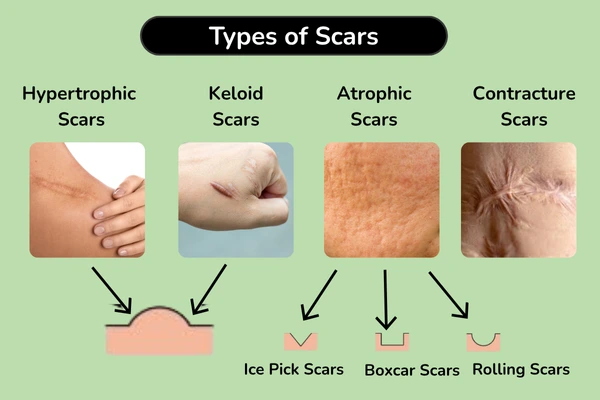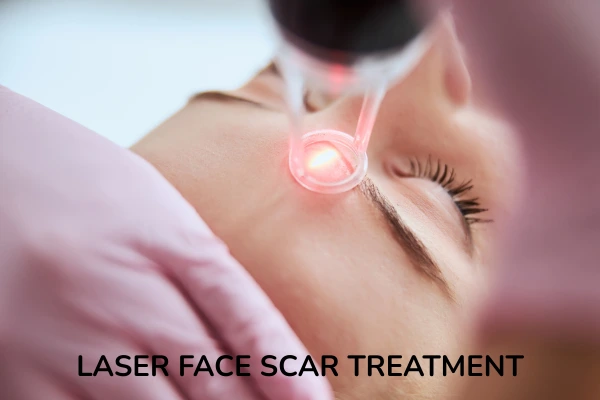Up to 25% OFF on Selected Treatments
-
Treatments
Acne and Scar
Pigmentation
Laser Hair Reduction
Dermato-surgery
Body
Anti Aging
Skin Rejuvenation
Others
- Clinics
- Blogs
Treatments
Do facial scars keep reminding you of past acne or injury every time you look in the mirror? Whether it’s a stubborn acne scar, a surgical scar, or an injury-related mark, facial scars can impact more your self confidence making the desire to eliminate them completely is understandable. The good news is that advanced facial scar treatment options have come a long way to eliminate those unsightly marks and restore your skin’s natural radiance. To be well-informed and confident in your journey to flawless skin, read this blog to learn about the causes, types and best treatments available to heal facial scars, especially for residents of Bangalore, where pollution, UV exposure and humidity often worsen scar visibility.
Why Bangalore Residents Need Facial Scar Treatment?
You might be facing environmental triggers like:
At Evenly Skin & Hair Clinic in Bangalore, our treatments are designed to reverse these effects. Our Expert dermats brings years of expertise in treating facial scars specific to Bangalore’s climate and lifestyle.
Before knowing the treatment options, it is essential to know the nature of the scars. Our skin, a remarkable barrier safeguarding our internal organs, is equipped with a sophisticated healing mechanism. When you face an injury, the body swiftly initiates a repair process to restore its protective function.
This initial phase, known as inflammation, is crucial. Blood vessels dilate to increase blood flow, while white blood cells, the body’s defenders, rush to the wound site to combat infection. As inflammation subsides, the body shifts into the rebuilding phase, where collagen, a structural protein, is produced to repair the damaged tissue. However, this process can sometimes result in an abnormal buildup of collagen, leading to raised, depressed, or discoloured scars.
Several factors influence scar formation, including:
While some scars fade over time, others may require aggressive treatment for optimal results. Understanding these factors is crucial in preventing and treating scars effectively.
Scars are as varied as the experiences that create them, each with its unique characteristics.

The choice of facial scar treatment depends on various factors, including the scar type, age, location, and your desired outcome. Here is an overview of our commonly used advanced facial scar treatment options.

Laser removal treatment is one of the highly effective treatment to address various types of facial scars. It uses concentrated light beams to remove the outer layer of damaged skin or stimulate the growth of collagen and new skin cells, improving the texture and colour of scars. At Evenly, we use fractional CO2 lasers to regenerate healthy skin.
Must Read: Effective Pimple Scar Treatments: How Lasers Can Transform Your Skin
Microneedling involves using tiny needles to create micro-injuries in the skin, triggering the body’s natural healing process and promoting collagen production. This treatment is effective in improving the texture and appearance of atrophic scars. Combining microneedling with platelet-rich plasma (vampire facial) can enhance results, as PRP contains growth factors that accelerate healing and visibly helps heal facial scars faster.
Chemical peels involve applying a chemical solution to the skin, causing the top layer to peel off and revealing smoother, regenerated skin underneath. These treatments offer improvement for surface scars and enhance skin’s overall quality. Different types of chemical peels include:
Must Read: What is chemical peel and how does it transform your skin?
Dermal fillers are used to fill atrophic scars, making them less noticeable. Hyaluronic acid-based fillers are commonly used for this purpose, as they provide immediate results and stimulate collagen production.
MNRF combines microneedling with radiofrequency energy to target deeper layers of the skin, enhancing collagen and elastin production. This treatment is effective in reducing the appearance of deep scars and improving skin texture.
Microdermabrasion involves exfoliating the skin with a specialised device to remove the outermost layer of dead skin cells. This treatment improves the appearance of superficial facial scars and promotes a smoother, more even skin texture.
Intralesional injections involve injecting corticosteroids or other medications directly into the scar tissue to reduce inflammation and flatten raised scars. This treatment is especially efficacious for keloid and hypertrophic scarring.
At Evenly Skin and Hair Clinic, our dermatologists may recommend a combination of these treatments to achieve the best possible results for your specific type of scar. Our goal is to help you achieve smoother, healthier skin and restore your confidence.
At Evenly Skin and Hair Clinic, we follow a comprehensive and personalised approach to facial scar removal. Our experienced dermatologists use advanced techniques to ensure optimal results. Here’s a step-by-step overview of our facial scar removal treatment procedure:
Achieving the best results may require multiple treatment sessions. Our dermatologist will schedule follow-up visits to assess the effectiveness of the treatments and make necessary adjustments. Maintenance treatments may be recommended to sustain the results and prevent new scars from forming.
Our advanced scar treatment procedures have helped many individuals to improve the appearance of their scars. Below before and after images are one of our clients, who gained remarkable changes after undergoing scar removal treatment.


Selecting the optimal scar treatment requires careful consideration. Consulting a dermatologist is crucial to determining the most suitable approach for your specific needs. Factors to discuss with the doctor include:
It’s important to remember that scar treatment is often a gradual process. While significant improvements can be achieved, complete elimination may not be possible in all cases. Patience is required.
To maximise results, consider the following tips:
What is the Fastest Way to Heal Facial Scars Naturally?
While clinical treatments deliver the best results, here are a few natural remedies that can support healing:
For deeper or older scars, combining these remedies with advanced procedures, like laser face scar removal or microneedling with PRP, yields the fastest and most noticeable improvements.
Scars can be a source of self-consciousness, but with the right approach, you can regain your confidence. Advanced scar treatment options offer hope and confidence to those struggling with facial scars. By understanding your options, working closely with a qualified dermatologist, and following a personalised treatment plan, you can significantly improve the appearance of your scars effectively.
For health-related information, follow us on Instagram.
Click here for an online consultation.
Can all types of facial scars be completely removed?
Not always, but with multiple sessions of laser face scar removal or microneedling, significant improvement is achievable.
Are there any side effects?
You may experience redness, swelling, or temporary discomfort at the treatment site, especially with laser face scar removal treatment. These side effects tend to be temporary and cause minimal discomfort. Your dermatologist will review potential side effects and provide management guidance.
How do hypertrophic and keloid scars differ?
Hypertrophic scars are raised scars that remain within the boundaries of the original wound, while keloid scars extend beyond the wound and can continue to grow.
Can scar treatments prevent new scars from forming?
Some treatments like PRP and laser can help heal facial scars,and support healthier skin to reduce furture scarring. To minimise the risk of new scars, it is essential to follow proper wound care practices, including keeping the area clean, avoiding sun exposure, and seeking timely treatment for injuries.
Can scar treatments help with scars from surgery or injury?
Yes, scar treatments can be effective for scars resulting from surgery or injury. Depending on the type and severity of the scar, your dermatologist may recommend various treatments.
Can I return to normal activities after scar treatment?
Most scar treatments have minimal downtime, allowing you to return to normal activities relatively quickly. However, you may need to follow specific aftercare instructions, such as avoiding strenuous exercise or sun exposure for a period.
We hope this information has been helpful. If you have any skin and hair-related questions or would like to discuss personalized solutions, please reach out to us at 7337899030. Our team of experts is dedicated to providing personalized care that meets your unique needs. Take the first step towards a healthier, more confident you by scheduling a consultation with us today. Your journey to vibrant skin and stronger hair begins here.
Book an Appointment
Start your journey to healthy skin and hair today.
Leave a Comment